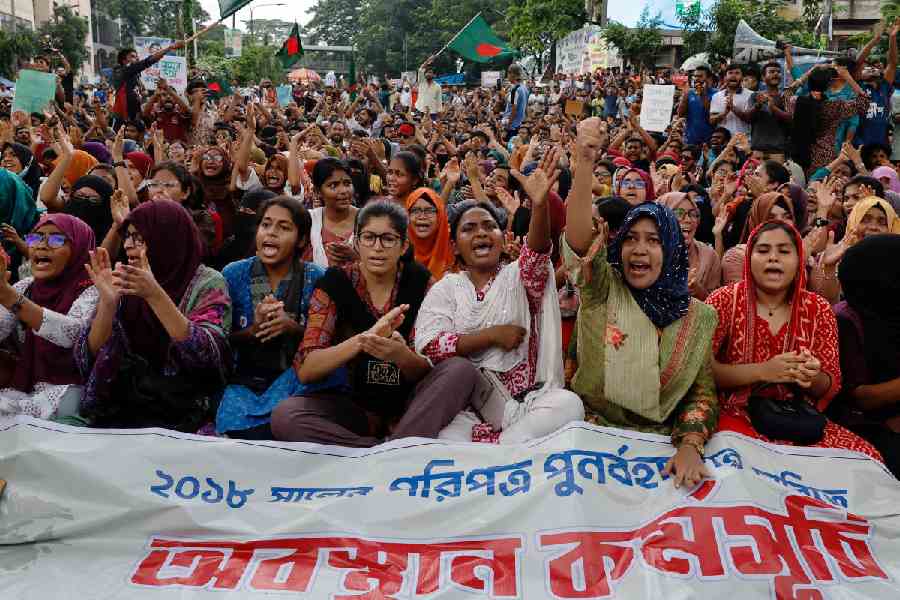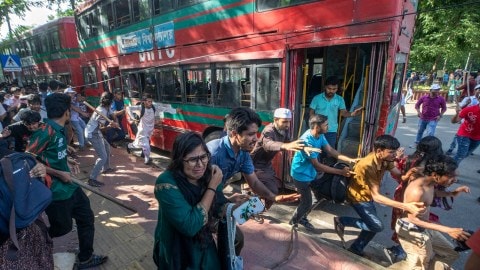In Bangladesh, recent violent clashes have erupted over the government’s job quota system, which reserves positions for women, disabled individuals, and ethnic minority groups. However, the primary focus of student protests has been against job reservations specifically designated for veterans’ families. The protests have intensified, leading to scores of injuries as tensions escalate over perceived inequalities and fairness in the allocation of government employment opportunities.

Police fired tear gas and charged with batons during violent clashes between a pro-government student body and student protesters overnight, leaving dozens injured at a public university outside Bangladesh’s capital, authorities and students said Tuesday.
The violence spread early Tuesday at Jahangir Nagar University in Savar, outside Dhaka, where protesters demanded an end to a quota reserved for family members of veterans who fought in Bangladesh’s war of independence in 1971, allowing them to take up 30% of governmental jobs. While job opportunities have expanded in Bangladesh’s private sector, many find government jobs stable and lucrative.
Each year, some 3,000 such jobs open up to nearly 400,000 graduates. Protesters argue such quota appointments are discriminatory and should be merit-based. Some even said the current system benefits groups supporting Prime Minister Sheikh Hasina. Some Cabinet ministers criticized the protesters, saying they played on students’ emotions.
- Clashes and Police Response: Police used tear gas and batons against student protesters, resulting in dozens of injuries at Jahangir Nagar University.
- Protest Demands: Protesters called for the elimination of a job quota that reserves 30% of government positions for veterans’ families.
- Employment Context: Government jobs are seen as stable and lucrative, with about 3,000 positions available annually for nearly 400,000 graduates.
- Protesters’ Arguments: The quota system is viewed as discriminatory, with calls for a merit-based appointment process.
- Political Criticism: Some Cabinet ministers accused protesters of manipulating students’ emotions for political gain.

Protesters gathered early Tuesday in front of the vice-chancellor’s residence at Jahangir Nagar University, where violence erupted. Demonstrators accused the Bangladesh Chhatra League, the student wing of Prime Minister Sheikh Hasina’s ruling Awami League party, of attacking their peaceful protest. Local media reported that both police and the ruling party-backed student wing assaulted the protesters.
Senior police official Abdullahil Kafi stated that police fired tear gas and “blank rounds” after being attacked by protesters, resulting in up to 15 police officers being injured. More than 50 people were treated at Enam Medical College Hospital, with at least 30 suffering pellet wounds, according to medical officer Ali Bin Solaiman.

- Violence at Dhaka University: On Monday, clashes erupted at Dhaka University, resulting in over 100 student injuries.
- Continued Protests: Protesters in Dhaka plan to continue demonstrating on Tuesday.
- Veterans’ Quota System History: The quota system for veterans’ families was halted after mass protests in 2018 but was reinstated by the High Court last month, sparking renewed protests.
- Supreme Court Involvement: The Supreme Court halted the High Court’s order for four weeks and requested students return to classes, promising a decision within that time frame.
- Prime Minister’s Statement: Prime Minister Hasina stated the matter is now in the hands of the Supreme Court, but protests have continued, disrupting traffic in Dhaka.
- Additional Quotas: The quota system also reserves jobs for women, disabled people, and ethnic minority groups, but protests have focused solely on the veterans’ families’ quota.
- Political Context: Prime Minister Hasina maintained power in a January election boycotted by the main opposition party due to her refusal to hand over power to a caretaker government for election oversight.
Historical and Political Context:
Her party favors keeping the quota for the families of the 1971 war heroes, as the Awami League, led by her father Sheikh Mujibur Rahman, spearheaded the independence war with India’s assistance. Rahman was assassinated along with most of his family in a military coup in 1975. In 1971, the Jamaat-e-Islami party, which later shared power with the Bangladesh Nationalist Party (BNP) led by Hasina’s archrival, former Prime Minister Khaleda Zia, openly opposed the independence war and formed groups that assisted the Pakistani military against pro-independence forces. All major political parties in Bangladesh have active student wings throughout the nation.





